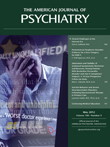T
o the E
ditor: In the January issue of the
Journal, Helena Chmura Kraemer, Ph.D., and colleagues (
1) ask, in anticipation of the results of the DSM-5 field trial reliability study, how much reliability is reasonable to expect. They argue that standards for interpreting kappa reliability, which have been widely accepted by psychiatric researchers, are unrealistically high. Historically, psychiatric reliability studies have adopted the Fleiss standard, in which kappas below 0.4 have been considered poor (
2). Kraemer and colleagues propose that kappas from 0.2 to 0.4 be considered “acceptable.” After reviewing the results of three test-retest studies in different areas of medicine (diagnosis of anemia based on conjunctival inspection, diagnosis of pediatric skin and soft tissue infections, and bimanual pelvic examinations) in which kappas fall within ranges of 0.36–0.60, 0.39–0.43, and 0.07–0.26, respectively, Kraemer et al. conclude that “to see κ
I for a DSM-5 diagnosis above 0.8 would be almost miraculous; to see κ
I between 0.6 and 0.8 would be cause for celebration.” Therefore, they note that for psychiatric diagnoses, “a realistic goal is κ
I between 0.4 and 0.6, while κ
I between 0.2 and 0.4 would be acceptable.”
When we (R.L.S., J.B.W.W.) conducted the DSM-III field trial, following the Fleiss standard, we considered kappas above 0.7 to be “good agreement as to whether or not the patient has a disorder within that diagnostic class” (
3). According to the Kraemer et al. commentary, the DSM-III field trial results should be cause for celebration: the overall kappa for axis I disorders in the test-retest cohort (the one most comparable methodologically to the DSM-5 sample) was 0.66 (
3). Therefore, test-retest diagnostic reliability of at least 0.6 is achievable by clinicians in a real-world practice setting, and any results below that standard are a cause for concern.
Kraemer and colleagues' central argument for these diagnostic reliability standards is to ensure that “our expectations of DSM-5 diagnoses…not be set unrealistically high, exceeding the standards that pertain to the rest of medicine.” Although the few cited test-retest studies have kappas averaging around 0.4, it is misleading to depict these as the “standards” of what is acceptable reliability in medicine. For example, the authors of the pediatric skin lesion study (
4) characterized their measured test-retest reliability of 0.39–0.43 as “poor.” Calling for psychiatry to accept kappa values that are characterized as unreliable in other fields of medicine is taking a step backward. One hopes that the DSM-5 reliability results are at least as good as the DSM-III results, if not better.

